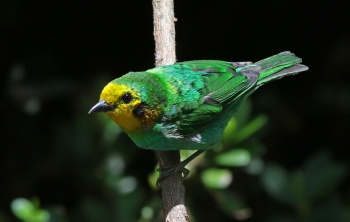Olivewarbler (talk | contribs) |
(Imp sizes. Clearer female image. References updated) |
||
| (10 intermediate revisions by 3 users not shown) | |||
| Line 1: | Line 1: | ||
| − | [[Image:Multicolored_Tanager.jpg|thumb| | + | [[Image:Multicolored_Tanager.jpg|thumb|400px|right|Photo by {{user|Robert+Scanlon|Robert Scanlon}} <br />El 18, near Cali, Valle del Cauca, [[Colombia]], March 2006]] |
;[[:Category:Chlorochrysa|Chlorochrysa]] nitidissima | ;[[:Category:Chlorochrysa|Chlorochrysa]] nitidissima | ||
==Identification== | ==Identification== | ||
| − | The male truly is | + | 12 cm (4¾ in) |
| − | + | The male truly is multicoloured, with head mostly yellow but with black spot under and behind the eye, green rear crown and nape, yellow mantle, green wings and tail, blue-green rump, throat yellow bordered to the side by chestnut, mostly blue underparts with central black area, and black eye and bare parts. | |
| − | |||
| − | |||
| − | |||
| + | Female is greener above and lacks the black on central underparts but otherwise similar. | ||
| + | Juvenile is overall green with orange legs and beak. | ||
| + | ==Distribution== | ||
| + | [[Image:OV1A4469 filtered.jpg|thumb|350px|right|Female<br />Photo by {{user|Pitter|Pitter}}<br />Dapa, Valle del Cauca, [[Colombia]], July 2017]] | ||
| + | [[South America]]: [[Colombia|Colombian]] endemic. One of the most highly sought after species in Colombia. | ||
| + | |||
| + | Patchily distributed in the West Andes through Cauca, Valle del Cauca, Chocó, Risalralda, and Antioquia Departments. As well, it can be found in the Central Andes through the Coffee Region (Quindio, Risalralda, and Caldas). | ||
==Taxonomy== | ==Taxonomy== | ||
| − | This is a [[Dictionary_M- | + | This is a [[Dictionary_M-O#M|monotypic]] species<sup>[[#References|[1]]]</sup>. |
| + | |||
==Habitat== | ==Habitat== | ||
| − | Cloud forest is its preferred habitat and is most usually spotted along forest edge in the mid-level inter-Andean slopes around 2000 MASL. | + | Cloud forest is its preferred habitat and is most usually spotted along forest edge at various heights from shrubs to canopy in the mid-level inter-Andean slopes around 2000 MASL. |
| − | |||
| − | |||
==Behaviour== | ==Behaviour== | ||
Frequents mixed flocks. Gleans insects but also eats fruits and berries. Quite often present in the canopy and therefore difficult to see. | Frequents mixed flocks. Gleans insects but also eats fruits and berries. Quite often present in the canopy and therefore difficult to see. | ||
==References== | ==References== | ||
| − | #{{Ref- | + | #{{Ref-Clements6thAug16}}#Restall et al. 2006. Birds of Northern South America. Yale University Press. ISBN 9780300124156 |
| − | # Birdforum member, personal observations | + | #Birdforum member, personal observations |
| + | #Handbook of the Birds of the World Alive (retrieved July 2017) | ||
{{ref}} | {{ref}} | ||
==External Links== | ==External Links== | ||
{{GSearch|Chlorochrysa+nitidissima}} | {{GSearch|Chlorochrysa+nitidissima}} | ||
[[Category:Birds]] [[Category:Chlorochrysa]] | [[Category:Birds]] [[Category:Chlorochrysa]] | ||
Latest revision as of 20:05, 11 July 2017
- Chlorochrysa nitidissima
Identification
12 cm (4¾ in) The male truly is multicoloured, with head mostly yellow but with black spot under and behind the eye, green rear crown and nape, yellow mantle, green wings and tail, blue-green rump, throat yellow bordered to the side by chestnut, mostly blue underparts with central black area, and black eye and bare parts.
Female is greener above and lacks the black on central underparts but otherwise similar.
Juvenile is overall green with orange legs and beak.
Distribution
South America: Colombian endemic. One of the most highly sought after species in Colombia.
Patchily distributed in the West Andes through Cauca, Valle del Cauca, Chocó, Risalralda, and Antioquia Departments. As well, it can be found in the Central Andes through the Coffee Region (Quindio, Risalralda, and Caldas).
Taxonomy
This is a monotypic species[1].
Habitat
Cloud forest is its preferred habitat and is most usually spotted along forest edge at various heights from shrubs to canopy in the mid-level inter-Andean slopes around 2000 MASL.
Behaviour
Frequents mixed flocks. Gleans insects but also eats fruits and berries. Quite often present in the canopy and therefore difficult to see.
References
- Clements, J. F., T. S. Schulenberg, M. J. Iliff, D. Roberson, T. A. Fredericks, B. L. Sullivan, and C. L. Wood. 2016. The eBird/Clements checklist of birds of the world: v2016, with updates to August 2016. Downloaded from http://www.birds.cornell.edu/clementschecklist/download/
- Restall et al. 2006. Birds of Northern South America. Yale University Press. ISBN 9780300124156
- Birdforum member, personal observations
- Handbook of the Birds of the World Alive (retrieved July 2017)
Recommended Citation
- BirdForum Opus contributors. (2024) Multicolored Tanager. In: BirdForum, the forum for wild birds and birding. Retrieved 20 May 2024 from https://www.birdforum.net/opus/Multicolored_Tanager





